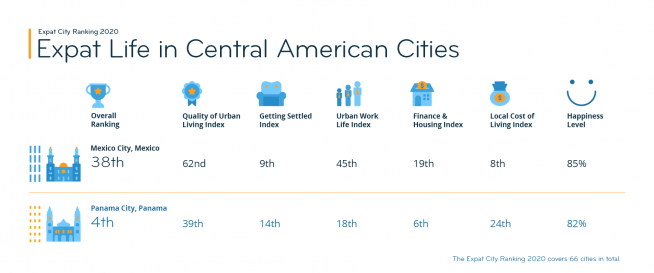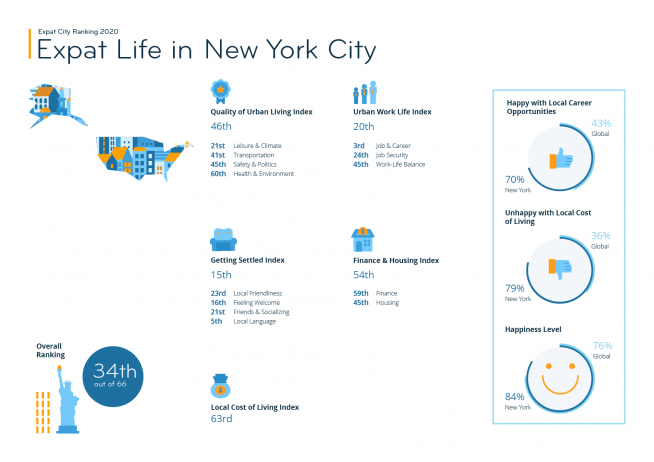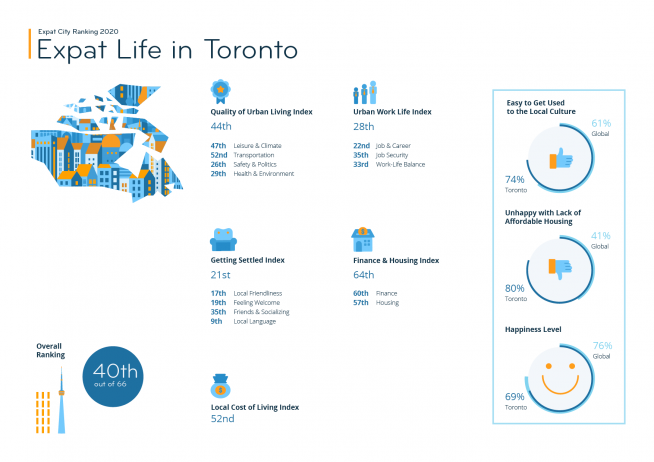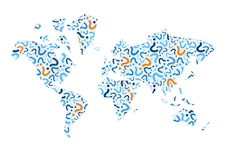Cities in North America
4. Panama City, Panama
The Panamanian capital is not only the best-rated Latin American city in the Expat City Ranking 2020 but even makes it into the global top 5 (4th out of 66). This is mainly due to its performance in the Finance & Housing (6th) and Getting Settled (14th) Indices.
Expats in Panama City are more than satisfied with their financial situation (72% positive responses vs. 61% globally). They also consider it easy to find housing (4th), and more than half (55%) describe the available housing as generally affordable (vs. 41% globally). In addition to this, about three in four expats (76%) also feel at home in Panama City (vs. 64% globally), and 44% even agree completely (vs. 27% globally). “I think there’s room for development for me as a person. I am ready to see what Panama has in store for me,” a female expat from Kenya comments.
Panama City does just slightly worse in the Urban Work Life Index (18th). On the one hand, 70% of survey participants are satisfied with their jobs overall (vs. 65% globally), and 43% even say they could not be any happier (vs. 20% worldwide). However, it seems difficult to get a job in the first place: Panama City comes in 41st place for local career opportunities.
The city’s weakest point is the local quality of life. Panama City only places 39th in the respective index, and expats are particularly dissatisfied with infrastructural factors such as public transportation (48th) and the urban environment (50th).
34. New York City, USA
In the Expat City Ranking 2020, NYC lands in a solid 34th place out of 66. Getting settled seems to be easy in New York City, with the city ranking 15th in this index. Expats find it relatively easy to get used to the local culture (76% vs. 61% globally) and to make new friends (57% vs. 47% worldwide). They also describe the population as friendly towards foreign residents (74% vs. 66% globally).
The city ranks well in the Urban Work Life Index (20th), too. Expats are optimistic about their career opportunities (70% vs. 43% globally) and the local economy (77% vs. 63% globally). However, they seem to work hard for their career options — their satisfaction with work-life balance is just about average (66% happy vs. 64% worldwide).
The city performs noticeably worse in the Quality of Urban Living Index (46th) and even ranks last worldwide for the affordability of medical care (66th). While 22% are also unhappy with its quality (vs. 16% globally), a staggering 69% describe healthcare as unaffordable (vs. 21% worldwide). “I do not understand how you can pay insurance for the privilege of going to a doctor — and then pay even more,” a Canadian expat wonders. Even New York’s outstanding leisure options (7th) cannot make up for this.
Not only healthcare is expensive in NYC: 36% of expats struggle with their finances, compared to 21% worldwide, and four in five (80%) find housing unaffordable (vs. 41% globally).
38. Mexico City, Mexico
Mexico City only lands in a mediocre 38th place out of 66 in the Expat City Ranking 2020. In the Quality of Urban Living Index (62nd), it even ends up among the bottom 5, mainly due to its results in the Safety & Security (64th) and the Health & Environment (62nd) subcategories. Expats are particularly dissatisfied with the availability of healthcare (33% unhappy vs. 13% globally) and their personal safety (48% negative responses vs. 9% globally).
The city fares a little better in the Urban Work Life Index (45th). Interestingly, the respondents tend to view their local career opportunities favorably (60% positive responses vs. 43% worldwide), while rating the general state of the local economy harshly (32% negative answers vs. 18% globally). They are also less satisfied with their working hours than the average (27% unhappy vs. 17% globally).
On the other hand, expats feel confident about finance and housing (19th). Mexico City does especially well for affordable housing (27% negative ratings vs. 41% globally). Moreover, 63% of expats are satisfied with the cost of living in general (vs. 46% worldwide), with the city placing eighth in the Local Cost of Living Index.
Lastly, the city also ranks among the top 10 in the Getting Settled Index (9th). Over four in five expats (85%) describe the local population as generally friendly (vs. 68% globally), and 82% find it easy to get used to the local culture (vs. 61% globally). “I love how easy it is to get along with the local people,” says an expat from Portugal.
40. Toronto, Canada
In the Expat City Ranking 2020, Toronto ranks 40th out of 66 cities in total. It performs very poorly in the Finance & Housing Index (64th), only ahead of Munich (65th) and Dublin (66th). Just 53% of expats are satisfied with their financial situation (vs. 61% globally), and nearly three in ten (28%) say their income is not enough to cover their living expenses (vs. 21% globally). Property prices and rental costs in Toronto also seem to be very high, as 80% of respondents find housing unaffordable (vs. 41% globally). “The real estate market in Toronto is crazy expensive, and it is unrealistic to purchase a home,” explains an expat from Serbia.
Toronto also comes in a sub-par 44th place in the Urban Quality of Life Index: for example, 35% of expats rate the public transportation system negatively (vs. 24% globally). The Canadian city also performs poorly in the Leisure & Climate subcategory (47th) — more than one out of four expats (26%) are unhappy with the weather (vs. 20% globally). “The winters are harsh and there are many days without the sun in the sky,” says an expat from Azerbaijan.
However, Toronto performs a lot better in the Getting Settled Index (21st). Expats agree that it is easy to get used to the local culture (74% vs. 61% globally), which might be partly due to the fact that it is so easy to learn the local language. Moreover, expats appreciate that the people in Toronto are generally friendly towards foreign residents (75% vs. 66% globally). Lastly, work also seems to be a benefit of expat life in Toronto: 61% are happy with their local career opportunities (vs. 43% globally), and 65% are satisfied with their job in general, which matches the global average (65%).






